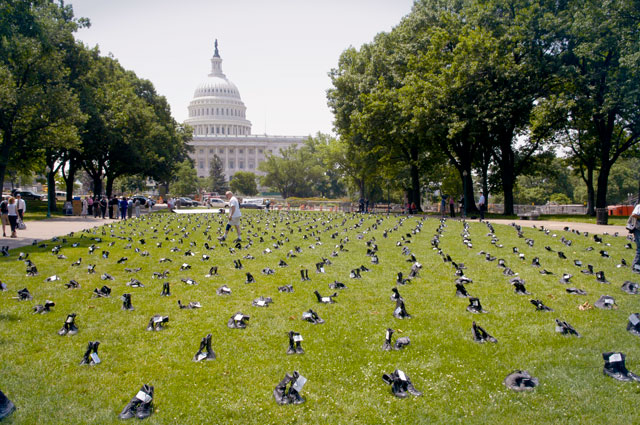
After the 2003 U.S.-led invasion of Iraq, AFSC's "Eyes Wide Open" exhibition helped visualize the human cost of war. Terry Foss / AFSC
I was on the outskirts of New York City on September 11, 2001 when I got the news that an airplane had crashed into the World Trade Center. My twin brother was in his office on the 85th floor. I tried to call him but couldn’t get through.
The plane hit eight floors above my brother’s office. He ran down the stairs, stepping outside minutes before the building collapsed behind him. He is alive. Thousands are not. That day, I decided to dedicate my life to understanding what motivates violence.
Today, I serve as the Associate General Secretary for International Programs for the American Friends Service Committee (AFSC), a Quaker organization operating in 17 countries. Doing this work, I have seen time and again the power of diplomacy, dialogue and policies grounded in the wellbeing of all.
But the U.S. government took the opposite approach. Leaders across the political spectrum chose retribution, using the attacks on the Twin Towers as justification for endless wars in Iraq and Afghanistan, and a xenophobic “war on terror” that spanned the globe.
More than 900,000 people have been killed in these wars. At least 37 million people have been forcibly displaced, tearing apart families, destroying communities, and fragmenting societies in ways that will take generations to repair.
The war in Afghanistan initially had massive bipartisan support – in 2002, 93% of people in the U.S. supported the war. AFSC was one of the few national organizations publicly speaking out against the invasion. As the war began, we sent relief to Afghan refugees in Pakistan and organized protests across the U.S.

In 2003, AFSC helped lead the movement opposing the invasion of Iraq. For years we toured the country with public installations highlighting military and civilian deaths. As the war dragged on into three subsequent administrations, we worked to expose the trillions of dollars spent on war and opposing the use of drones and the criminalization and surveillance of Muslim and Arab communities. Public opinion changed, but the wars continued.
Over 20 years, the U.S. has spent more than $2 trillion dollars waging war on Afghanistan. Less than 2% of that went directly to improve the lives of Afghan people. We now know – thanks to the Afghanistan Papers – that U.S. leaders knew the war would only lead to further devastation, yet they continued to bomb.
In April of 2021, President Biden announced he would withdraw U.S. troops from Afghanistan, a move that had strong bi-partisan support. But Biden, like the Trump administration before him, failed to take adequate steps to start evacuating people. By mid-August, the Taliban had already taken power and the Biden administration’s efforts to get people out were far too little and too late.
Now, thousands of people are desperately trying to leave the country. Family members, military veterans and aid workers are scrambling to find safe passage for their friends and colleagues. But many visa-eligible Afghans were unable to make it through the airport gates. The P2 visa system requires that Afghans seeking asylum must first relocate to a third safe county – an almost impossible requirement as embassies and borders close.
The U.S. must honor our commitment to the Afghan people by ensuring safe passage for all that want to leave, and humanitarian assistance for those who remain. This could include working with surrounding countries to provide temporary transit visas, negotiating with the Afghan leaders to ensure passage, and expediting the SIV, P1 and P2 application processes to help more people get out more quickly.
Though the Twin Towers fell 20 years ago, I can remember the fear I felt like it happened yesterday – the icy terror of calling my brother over and over without getting through, running by thousands of shocked, soot-covered people fleeing the area as I searched for him. Over the past month I have felt echoes of that same horror, staying up late into the night, making call after call, trying to help Afghan friends and former colleagues find safe passage, often without success. This cycle of violence and militarism must end.
Endless wars and the criminalization of Muslims and people of color have made the world far less safe. These wars have led to hundreds of thousands of civilian deaths and exacerbated the organized and political violence they claimed to counter.
Instead of waging war, the U.S. should support locally led political solutions. We should amplify the voices of civil society, especially the efforts of women and other marginalized people. We must invest in global shared security that rejects policies based on fear and military domination.
In our interconnected world, the health and safety of all are intrinsically interlinked. The militaristic vengeance that drove the U.S. response to 9/11 has led only to death and devastation. It’s time to reckon with the cost of our past actions and to create a more just and peaceful path forward.
